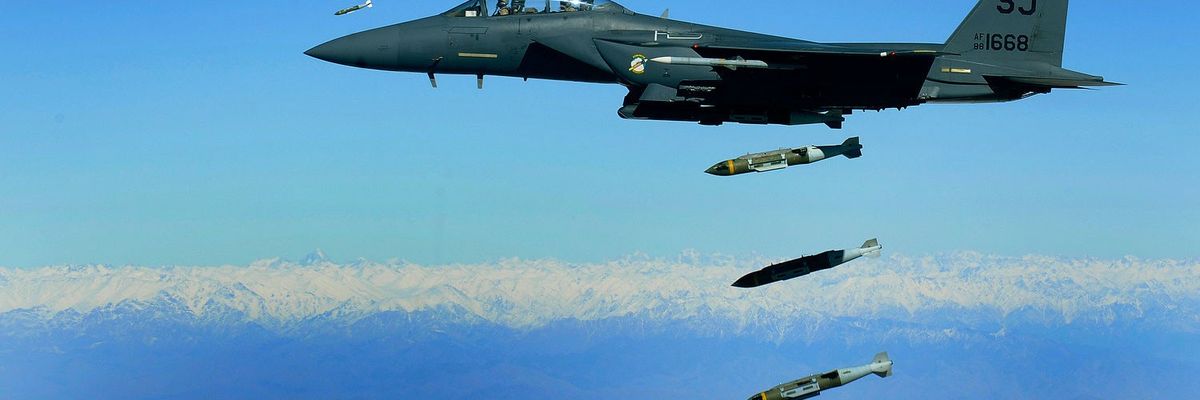Last week, after President Biden ably defended his decision to give up the war in Afghanistan, retired General Jack Keane — the Army mentor of General David Petraeus, and an important behind-the-scenes influence in George W. Bush's War on Terror — complained on Fox News that Biden had accused the Afghan government of not wanting to fight.
The Afghan government and army, Keane said, had been fighting the ground war in Afghanistan with some success since 2014, turning back annual Taliban offensives with the help of American air support and intelligence. They stopped fighting this year when we withdrew that assistance. Keane doesn’t seem to realize it, but he was pointing out the critical weakness in our attempt to train foreign militaries at least since Vietnam: Our own men do not fight without air support, on which they largely rely to kill the enemy, and therefore we cannot train foreign armies to do without it either.
The use of air power to deal with hostile fighters in the developing world dates back at least to 1919, when Winston Churchill, then British Minister of War and Air, seized upon air power as a relatively cheap means of controlling Iraq, which the British had just occupied. When areas revolted, the British believed, the occupiers could subdue them by bombing and strafing their villages. They became so wedded to this strategy that when they were planning for the general disarmament conference in Geneva that met in 1932, the British refused to submit a popular proposal for the abolition of aerial bombardment unless the prohibition could be limited to Europe.
The Second World War turned tactical air power into a critical element of American war-fighting. From the D-Day invasion of June 6, 1944, until Germany surrendered 11 months later, air supremacy over France and then Germany was perhaps the United States’ greatest asset. It made it impossible for the Germans to move mechanized forces during the day, except in bad weather, and it was a big asset in tank battles as well. One reason that the Battle of the Bulge in December 1944 initially went so well for the Germans was the cloud cover, which did not allow U.S. fighters to take part. Tactical air seems to have been somewhat less important in Korea, but by the time the United States began fighting in Vietnam in earnest in 1965, it had become critical. After making contact with the enemy, infantry relied on both fighters and helicopters to hit enemy troops from the air. In response, Viet Cong and North Vietnamese troops tried to “grab the enemy by the belts,” coming so close to the Americans that they could not use these assets without risking hitting their own men.
By 1972 practically no American infantrymen remained in South Vietnam, and the South Vietnamese Army (or ARVN) had to face a big North Vietnamese offensive without them. Only massive tactical air strikes saved them from collapse and enabled them to roll back some — though hardly all — of the North Vietnamese gains. Late in that year the Nixon Administration decided to end U.S military involvement in Vietnam completely as part of a peace agreement with North Vietnam. Realizing that the South Vietnamese needed air power to continue the fight, they embarked on a crash program to strengthen the South Vietnamese air force, redirecting planes that had been promised to other allies. As it out, however, the South Vietnamese could not effectively take over this task. According to CIA operative Frank Snepp in his book "Decent Interval" on the fall of South Vietnam, ARVN ground commanders requesting air or artillery support would not get it unless they paid money for it, and pilots flew too high for their bombing to be accurate.
Thus, when the North Vietnamese began another big offensive in early 1975 and it became clear that American air power would not step in to stop it, the ARVN rapidly collapsed. Then as now, some American authorities refused to believe how quickly the collapse would take place, and the evacuation of Americans and friendly South Vietnamese became chaotic.
There was, in short, some truth in what General Keane says, both in South Vietnam in 1975 and in Afghanistan in 2021. Without the promise of American air support, our local allies would not fight against major enemy offensives. What this leaves out of the analysis is the enemy. Both the North Vietnamese in 1975 and the Taliban now have won because they could fight without air support, which they never had. We spent 20 years in advisory and training missions both in Vietnam (1954-75) and in Afghanistan (2002-21), but we couldn’t train either one of their armies to fight on their own without our close air support. That, almost certainly, is because we do not train our own troops to fight without close air support either. It is is not, perhaps, coincidental that the El Salvadoran army in the 1980s did better against Communist guerrillas, fighting them to a standstill, even though they did not enjoy American air support.
The other, biggest reason for both of these defeats was political. Local American allies in South Vietnam could not match the dedication and organization of their enemies. In addition, both the Viet Cong and North Vietnamese troops in South Vietnam and the Taliban enjoyed sanctuaries across borders, first in North Vietnam and then in Pakistan. Nevertheless, we could not train our local allies to fight their enemies on equal terms, because we always rely on technological superiority. We see now where that leaves our partners. Perhaps we should have attempted to learn about local warfare from them, or at least acknowledge lessons from the past.
















